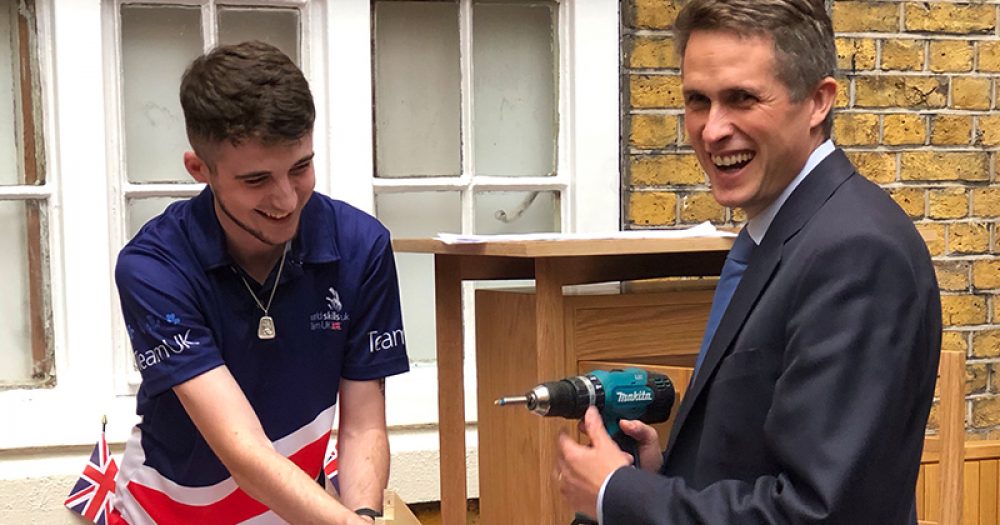Of all the words spoken at this week’s Conservative Party Conference, I don’t think any were more powerful or persuasive than those of the UK Education Secretary, Gavin Williamson.
Referencing the fact that we have just recently met the 1997 Labour government’s target of 50% of young people going to university, the Secretary of State’s speech spoke directly to what he called ‘the other 50%’: so many young people who, for too long, have not been prioritised by governments of all colours.
We can be in no doubt that new leadership in the Department for Education means a new approach to how apprenticeships and technical qualifications will be championed. Anyone who has met Williamson since he came into the role, as members of Team UK did before they flew out to Russia for this summer’s Skills Olympics, won’t doubt his ambition ‘to super-charge further education over the next decade’.
This is a Secretary of State who understands the value of our sector and is committed to working with us to realise the vast potential that we all know exists within it.
It’s in this spirit that I was struck by what the Secretary of State stated as his vision for 2029, 10 years into the future: ‘to overtake Germany in the opportunities we offer to those studying technical routes by 2029’. This is a bold, eye-catching goal.
For decades in this country we have held the German system up as the exemplar for what an ideal model of vocational education should look like, especially with respect to apprenticeships, and while we should be mindful of the differences between our economies and how their skill systems operate, international benchmarking is something we have been increasingly advocating.
There is unquestionably lots to admire about how Germany trains its young people, and lots we can learn from, but there is also no reason why, with the right levels of investment, the right leadership within DfE and the right provision of opportunities for our young people, we cannot surpass their achievements.
There is no reason that we can’t surpass Germany’s achievements
Indeed in the context of WorldSkills competitions we placed higher than Germany in the benchmark medal tables in 2015 and 2017, losing out to them this year by only one medal point. So I feel confident that, as part of the 10-year plan and the ‘2029 vision’ Williamson has set out, we can deliver on this if we take a strategic and holistic approach to learning from international best practice – in Germany and elsewhere – to invest in raising standards, boosting workforce development and supporting institutions.
The welcome commitments around new Institutes of Technology in England and the Skills and Productivity Board are key parts of this, but I would like to table another idea too. We should use the WorldSkills platform in the UK as part of this ten-year plan to galvanise change: not just inspiring millions of young people to take up apprenticeships and technical careers, and developing thousands of young people’s skills to higher levels every year, but also engaging our partners from around the world to learn from global skills innovation, including boosting standards of teaching, training and assessment.
Further, with WorldSkills Shanghai less than two years away (and building on the recent huge success of WorldSkills in Russia), we will be creating opportunities for our partners to learn from the best of the rest of the world in China – because seeing really is believing. We will shortly be publishing what we learned in Kazan from a ‘seeing is believing’ delegation from the construction sector, run in partnership with the National Open College Network.
International benchmarking is something we have been increasingly advocating
This builds on our recent Productivity Lab research with the RSA and FETL looking at the best of international skills systems to draw out the lessons we can apply here in the UK. We will be publishing more research and insights from global partners on best practice and what we can learn from mainstreaming skills excellence in other major economies.
We will also be creating opportunities for skills leaders in these countries to share their insights with us, starting at WorldSkills UK LIVE next month, where we are hosting a seminar for our partners to understand how Russia is embedding WorldSkills standards into their skill systems to drive up performance. Ultimately, we want to use the WorldSkills platform to help support the government to make its ambition a reality across the UK.
Williamson’s words this week should act as a catalyst for the sector to think big. We are just three months away from the start of a new decade and what we make of that new decade will be shaped by the decisions we make now. For the Education Secretary, that means setting the country on a course to beat one of our major strategic rivals come the decade’s end – and for us at WorldSkills UK it means stretching our global ambition to its fullest potential.









Your thoughts